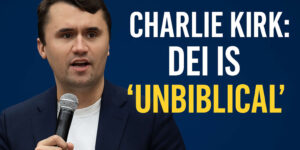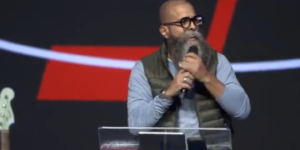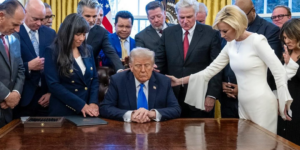A Voice for Immigrants
Samuel Rodriguez is more preacher than politician. These days, however, the leader of the nation’s largest group of Hispanic Christians is caught in the crossfire of immigration reform.
Lady Liberty has always lifted her lamp to the tired, the poor and the huddled masses, but Americans have not always welcomed immigrants with open arms. Today the climate is as hot as ever, as the need for border security and economic recovery clash with the vast number of illegal immigrants living among us. Only recently has the evangelical church taken a stand on the issues.
Now a man has emerged as another torchbearer, his leadership drawing millions out of the shadows. Top politicians and media moguls are paying attention, saying Samuel Rodriguez is a political rising star, and they’re watching and courting him as our nation wrangles over culture wars and immigration reform. Although the 40-year-old pastor and evangelist denies being a politician, he has embraced the call to represent a growing political force of evangelical Latinos, including 12 million illegal immigrants.
“I see my role as a Daniel, as a Joseph … a prophetic voice within the corridors of power to articulate a message of righteousness and justice,” Rodriguez says. The biblical mandate, as he sees it, is to approach the illegal immigration issue both with compassion, based on Leviticus 19, and the rule of law, based on Romans 13.
Rodriguez heads the largest association of evangelical Hispanics in America, the National Hispanic Christian Leadership Conference (NHCLC), with 16 million members, including more than 25,000 churches. Years before the controversial Arizona immigration law was enacted, one of the NHCLC’s multifaceted missions was campaigning for “just, biblical immigration reform.”
Earlier this year the National Association of Evangelicals along with the Southern Baptist Convention, Vineyard USA and many other organizations joined the NHCLC in framing a resolution that calls for securing the borders and devising a compassionate, strategic path for legalization.
Like a nation within a nation, the undocumented Latino population evokes impassioned debate from the halls of Congress to kitchen tables all across America. Many people see illegal immigrants as criminals by virtue of the fact that they sneaked across the border in the first place.
Drug wars, terrorism and poverty are some of the fears behind anti-immigrant sentiments here in the U.S. Ironically, those are the same issues many Latino immigrants are trying to escape in their own countries.
But why don’t people who just want to find honest jobs and a better way of life in America simply apply for legal entry?
It’s complicated.
“Twelve million people did not cross the Rio Grande with backpacks,” Rodriguez says. Many of them came legally on temporary visas and applied for extensions, he explains, but visas are limited, fees are costly and the U.S. Citizenship and Immigration Services (USCIS) is severely backlogged.
Meanwhile, the U.S. government winks at their presence because they provide cheap labor, while others accuse them of taking jobs from American citizens and draining government benefits.
International pressure, such as Mexico’s strong reaction against the Arizona law in July, is confronted with American outcry for governments to hammer poverty and drugs in their own countries so nationals can thrive in their homelands. Rodriguez believes many immigrants would like to return home, but when facing abject poverty or terror induced by drug lords, they risk staying in America illegally.
Until Rodriguez came along, says Richard Land, president of the Southern Baptist Convention’s Ethics and Religious Liberties Commission, “the Hispanic [evangelical] community was under-represented, in terms of leadership.”
According to the Pew Hispanic Center and the Pew Forum on Religion & Public Life, 16 million of the 47 million Hispanic Americans claim to be born-again Christians. Additionally, a third of all U.S. Catholics are Latinos, half of whom are charismatic.
Rodriguez says his life work is to converge the message of Billy Graham with the message of Martin Luther King Jr.
“It’s righteousness and justice,” he says. “It’s both.”
Rodriguez grew up in a tightly knit working-class family. As a boy, he was a different sort of kid, a spiritually conscientious child who loved books and hated to miss school. Like the biblical Samuel in the Old Testament, who as a youngster heard God calling him, Rodriguez seemed destined to hear and answer God’s call.
When he was 14, while watching an evangelist on TV, a quiet voice inside him said, “I’m going to take you to the nations, and you’re going to preach My Word.” An hour later, he turned to a show about Martin Luther King Jr., and he heard it again: “I’m going to make you a voice for your people.”
This first-generation son of Puerto Rican immigrants wasn’t quite sure what to make of that. He had grown up in an Assemblies of God church in Bethlehem, Pa., but he shrugged off the impression as an emotional reaction. Two weeks later, though, during a church service, a minister interrupted his own song on stage and asked if there was a “young Samuel” in the congregation.
“The Lord says, ‘I’m going to take you to the nations,'” he told the teen. “‘I’m going to make you a voice for your people, and I’m going to do great things with you.'”
A year later another guest minister had a similar message for him. “Because you didn’t believe me when I spoke to you last year,” he prophesied, “I will do it again in front of your own church so you will believe.”
“That put the fear of God in me,” Rodriguez says.
Leadership Calls
His calling unfolded quickly as people recognized his leadership qualities and passion for God. At age 14, he preached his first sermon. Soon after, he ventured into radio — a Spanish program called Moviendo Montanas (“Moving Mountains”) — and he held his first youth crusade at the age of 16.”It was the beginning of this wonderful journey,” he reminisces.
During this time he met Edward Crespo, who would ultimately become his right-hand man and the Hispanic coordinator for the National Day of Prayer. Rodriguez calls him his “armor bearer.â€
“[Rodriguez’s] leadership qualities were cutting-edge at the time,” says Crespo, describing him as competitive but very relational. The two men have driven many miles together, praying for hours at a time.
“Whatever was placed in front of him, he took it very seriously. He was very driven, but he did it out of love for God,” Crespo says.
By his early 20s, as one of the youngest men to be ordained by the Assemblies of God Spanish Eastern District, the fervent preacher was working as a regional youth leader for more than 300 churches and speaking internationally. He also launched a Spanish-language TV program on the Miracle Network and pursued his education.
His undergraduate work was at Bethany Bible Institute and University of Pennsylvania, and he earned a master’s in educational leadership from LeHigh University. Currently he is studying for his doctorate.
Jesse Miranda, an executive presbyter of the Assemblies of God, said some of the officers in Rodriguez’s district were leery of the young man’s bold ambitions. But Miranda’s advice was to let him run with his ideas. “He was always casting a new vision,” Miranda says. “I don’t want to kill a good idea from a good leader.”
In 1996, Rodriguez and his wife, Eva, founded a church called Third Day Worship Center in his Pennsylvania hometown, which later planted more churches in the U.S., Ghana and Pakistan. They also founded Third Day Believer’s Network, and today they co-pastor the Christian Worship Center in Sacramento, Calif.
“She’s my chief counselor, my best friend and chief adviser,” he raves. “She’s Tier 1 in vetting of ideas. By the grace of God we’ve given birth to five organizations.” The couple has three children, ages 13 to 19.
In 2002, Miranda, known by many as the godfather of Hispanic evangelicals, began seeking a successor for AMEN, a networking ministry he founded in 1992 that united Hispanics across 27 denominations and 73 faith-based organizations.
He asked Rodriguez to carry on the torch, and in 2005 they reformulated the ministry with a multicultural emphasis, absorbing it into the NHCLC. Miranda is currently CEO of the NHCLC and director of The Jesse Miranda Center for Latino Leadership at Vanguard University.
Today, as an advocate for the impending Latino swing vote, Rodriguez has the listening ear of President Obama as well as national Democrat and Republican leaders. He participated in the inaugural prayer service, advises the president on immigration and serves on the White House Task Force on Fatherhood.
Though Rodriguez says he disagrees with Obama on a number of issues, he adds: “I admire our president. I have respect for [him] as a person of color.”
The media has zeroed in on Rodriguez’s political work with immigration, which makes up only a small slice of his ministry, he says. Some even speculate that he might run for office, but to that he answers: “God has placed me, by His grace, in the political arena, and my answer is: “I’m not a politician. I’m first and foremost a preacher of the gospel.” Rodriguez is also author of two books, Path of Miracles and Are You a Third Day Christian?
Responding to Racism
A popular proverb says, “Experience is the best teacher.” For Rodriguez, his calling was birthed out of his life experiences, which included the sting of racism. As a boy, he got into fights at the all-white school he attended after moving to the suburbs.
“Every single day, white kids who were not accustomed to Hispanics went through the cockroach jokes and the commentary and condescending comments,” he remembers.
Years later, when Samuel and his young bride bought their first home in a white community, someone splattered eggs on their house, as if to say, “We don’t want your kind here.”
At a university exit exam, he was told that his Hispanic accent might prevent him from being a successful public speaker. “Mind you, I was already speaking before thousands of people on weekends,” he says. “And I remember saying to myself,’You’ve got to be kidding me!'”
But as a Christian, he wanted to respond and not react. “The greatest vengeance you can have is to love them and be compassionate,” he says. “It drew me to Dr. King and a place where I really wanted to reconcile the vertical message of salvation with the message of transformation for communities.”
A vision for that vertical/horizontal model is what drives Rodriguez. But he doesn’t always make nice with everyone while doing it. He unapologetically uses such words as “xenophobic,” “intolerant” and “nativistic” to describe those resistant to assimilating America’s fastest-growing ethnic group, and their culture, into society.
“I will call it by name as I believe it should be called,” he says. “I have received the e-mails and hate letters.” He told Newsweek he plans to “respond aggressively to attacks and perceived distortions.”
An Elephant in the Room?
The immigration issue is emotional and polarizing, but is all the rhetoric and debate creating a new sense of political correctness within the church? Is it un-Christian or racist to disagree with evangelical leaders on reform, or are non-Hispanic believers being narrow-minded?
“Not everyone who opposes immigration reform is anti-Latino,” Rodriguez says. “The small minority has hijacked the issue.”
He estimates that the NHCLC, which includes Hispanic and multicultural churches, has the support of up to 65 percent of the white evangelical church. He’s also building relationships with the black church through the National Hispanic Black Evangelical Alliance. From his perspective, the media is exaggerating the black-brown divide.
Land, of the SBC, says the immigration debate is exacerbating ethnic and racial tensions and that there are people on both sides trying to exploit that for political gain. “I think the Arizona law is a symptom that this issue is increasingly rending the social fabric of this nation,” he says.
For some, legalizing undocumented immigrants is a chance to win over 12 million new voters. Others see it as a security threat and an injustice to immigrants who have paid the price to enter the U.S. legally. Latinos who showed support for Arizona’s immigration law, namely the Arizona Latino Republican Association, are making news for their unpopular stance.
Rodriguez does’t deny the social implications of immigration reform — he doesn’t support amnesty or mass deportation — but he wants the church to see immigration as a moral issue.
He says Latinos are generally conservative, hard-working, family-oriented people who will strengthen the Judeo-Christian values of our nation. Of the 16 million people served by the NHCLC, up to 35 percent are undocumented immigrants, he says. “The elephant in the room is whether or not America is becoming too Latino,” he asserts.
Land states: “Among Southern Baptists it’s not an ethnic issue. The thing I most often hear is their profound frustration with the federal government for not enforcing the law.” The secondary issue, he says, is that Americans overall don’t want to be a bilingual nation.
However, as Miranda explains, “the ethos of the Latino is not either-or; it’s both-and. I’m bilingual and bicultural.” He says the Latino vote swings with issues rather than parties, which explains why they have not historically been staunch Democrats or Republicans.
Rodriguez concurs, saying he’s not sold out to either party. “It’s not the donkey or the elephant,” he says. “My agenda is the agenda of the Lamb.”
Anahid Schweikert, who was raised in an Armenian immigrant family, is a freelance writer and home educator near Memphis, Tenn. She and her husband have two internationally adopted children, and their family enjoys preserving their multiethnic heritage.
Why Immigration Reform Isn’t Just a Political Issue
By Samuel Rodriguez
In one of the most polarizing issues in our nation today—immigration—evangelicals stand front and center as the leading constituency in favor of a comprehensive solution. Widely recognized as social conservatives and the bloc that reinvigorated the Republican Party in the 1980s, evangelicals support reform because they understand not to puts the future of their movement at stake.There are at least three key reasons for this.
First, the growth of evangelical communities in the majority of denominations stems from the movement’s ethnic and immigrant constituency. In other words, support for immigration is a matter of both short-term and long-term viability and sustainability.
Second, evangelicals do not want to repeat history. In the 1960s when Martin Luther King Jr. marched for civil rights, evangelicals, with few exceptions, stood in the pews. They were at best apathetic to the civil rights movement, at worst hostile to it. Their lack of support resulted in a wall arising between the African-American church and the evangelical community that only today is showing some cracks. Evangelicals do not want history repeated with the 50 million-member Hispanic community.
Third, evangelicals view immigration reform as a biblical imperative. They understand the Bible supports reconciling the rule of law (see Rom. 13) with compassion for the stranger (see Lev. 19). They are poised to present a plan the vast majority of Americans can embrace a just integration strategy that is neither the Arizona law nor the amnesty solution.
It holds, first of all, that Arizona’s anti-immigration law creates an atmosphere that facilitates demagoguery while attracting xenophobic and nativistic supporters. Because of this, Republicans must vociferously rebuke the Arizona law in a manner that will engage the Latino electorate or otherwise suffer the consequences of alienating the nation’s largest minority community.
Conservatives might acquire short-term gains in Congress by galvanizing white voters through support for the Arizona law and opposition to immigration reform, but at the end of the day it is demographically and strategically impossible to win the White House without the Hispanic vote.
Conversely, a just integration strategy recognizes that amnesty undermines our nation’s security, dilutes our sovereign right to protect our borders and conveys a message of utter disrespect for the rule of law. While deportation of 12 million individuals is not practical, a just integration strategy requires the identification and deportation of serious criminals yet provides a pathway of integration for those hard-working people who commit to English and the rule of law.
Possibly the only hope for successful passage of immigration legislation lies with evangelicals. Their prophetic witness to the reconciliation of biblical law and compassion can make a difference. For, in the end, immigration reform is a matter of faith.
A Believer’s Guide to the Immigration Debate
By Alan Wisdom
There are no biblical passages laying out the details of a just immigration policy for the U.S. today. A modern nation like ours is not analogous to ancient Israel, nor are biblical figures easily comparable to contemporary illegal immigrants. Immigration is a complex subject, and there are no easy answers for it, but here are 10 considerations that thoughtful U.S. Christians should bear in mind:
1. The oft-quoted command in Leviticus 19:33-34 that “you shall not oppress the alien” should shape our attitude toward immigrants. But the passage doesn’t say how many aliens should be admitted to the U.S. today. Compassion for the foreigner does not necessarily mean admitting all comers.
2. The “sojourners” in ancient Israel were not illegal immigrants. They were temporary residents who agreed to comply with Israel’s laws and respect its customs. They could expect to receive basic justice, but not the full privileges of an Israelite.
3. Mary and Joseph were not illegal immigrants when they fled to Egypt to protect the baby Jesus. They were refugees seeking asylum from political persecution’a right that is recognized under today’s international law. There is no evidence that they broke any Egyptian laws.
4. Alongside the biblical teachings about hospitality to strangers stand the teachings about the importance of the rule of law. Passages such as Romans 13:1-7 and 1 Peter 2:13-17 stress a duty to obey properly constituted human authorities, when their demands do not violate conscience.
5. U.S. authorities are within their powers when they attempt to regulate the flow of immigration into this country. Any state that loses control of its borders will not be able to fulfill its basic God-given responsibility to protect its citizens.
6. It is important to distinguish the callings of church and state. The church is called by God to welcome all with the grace and mercy of Jesus Christ without distinction for nationality or immigration status. But the state is called by God to enforce justice. It properly makes distinctions between those who obey and those who break the law.
7. The state properly places first the welfare of its own citizens. It does not have to admit immigrants it believes will detract from national well-being.
8. There is no place for racism in the immigration debate. People shouldn’t be admitted to or excluded from the U.S. based on their ethnicity.
9. There are cases in which a state may decide to show mercy to those who have broken its laws. It may conclude that strict enforcement of the law — for example, trying to deport all illegal immigrants would be impossible or counterproductive.
10. The possible unintended consequences of granting amnesty to immigration-law violators must be weighed. We saw this demonstrated with the Immigration Reform and Control Act of 1986, in which amnesty for most who had been in the country illegally led to a spike in new illegal entries. The problem of illegal immigration was amplified.

























































